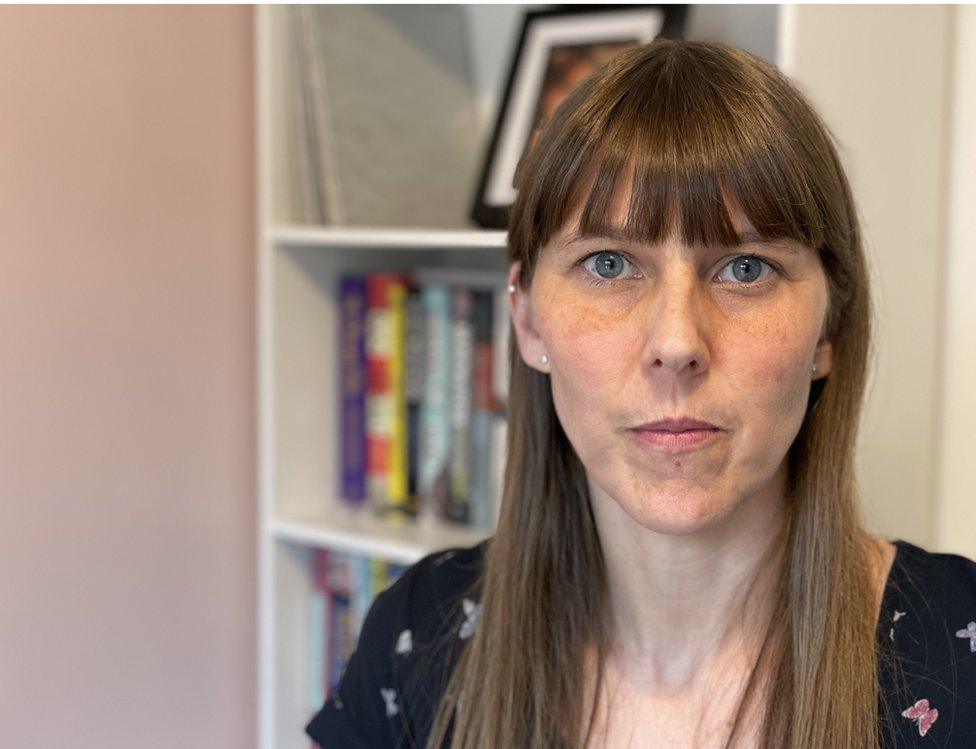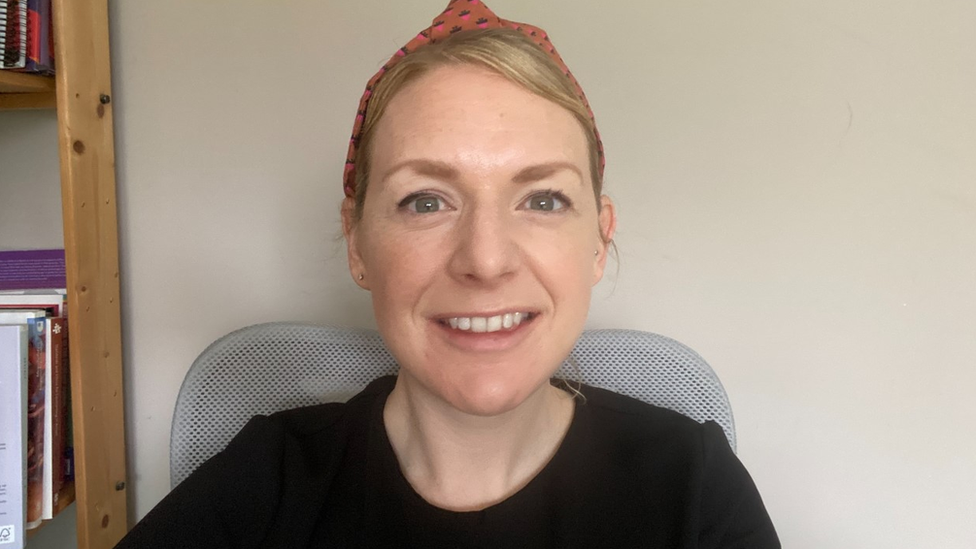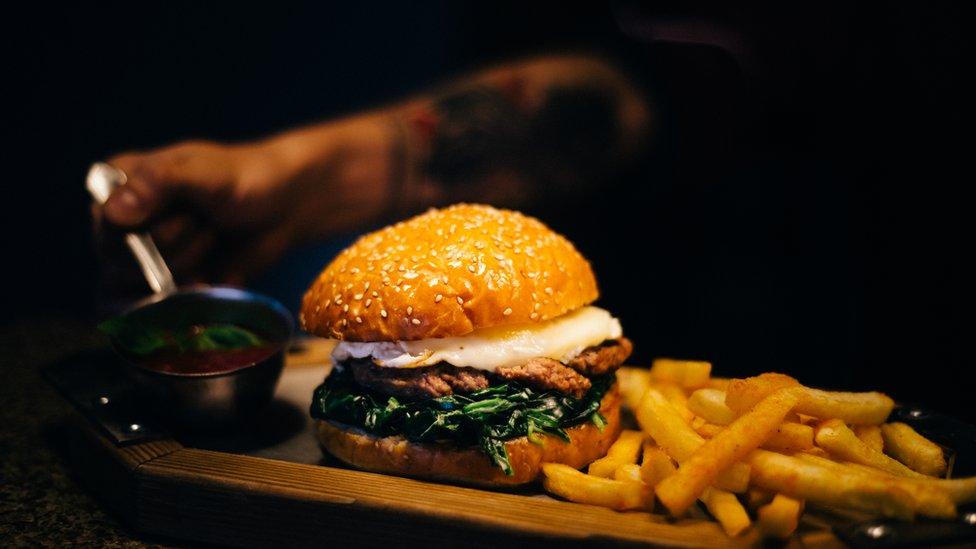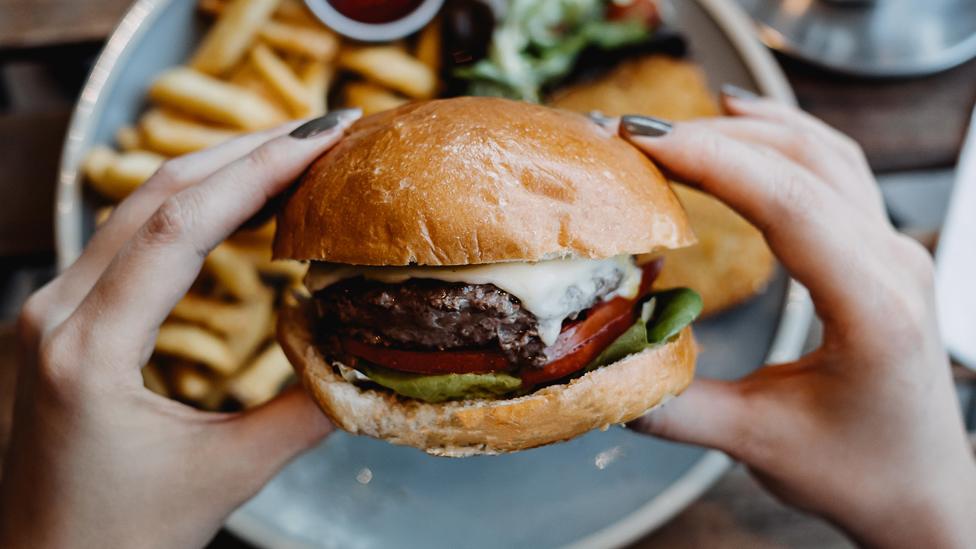'I felt like crying about calories being on menus'
- Published

Melissa thought she was recovered from her eating disorder until she had to contend with calories on menus
Some people with eating disorders say they are too scared to go out for a meal since the introduction of calories on menus in April.
The new legislation, designed to tackle obesity, has left many feeling anxious. Some are concerned there will be a new epidemic of people developing eating disorders.
If someone had asked Melissa Clarke a few months ago if she had recovered from her eating disorder, she would have said yes.
But then calories on menus started being discussed and even the thought of it made her worry.
"I felt like panicking at the thought and then the thought of how it might affect other people. Because if I'm in recovery and feel like that, then for other people in the middle of it, it must be so much worse.
"I was recovered or so I thought, so my reaction shocked me."
Melissa, 45, from Wymondham in Norfolk was diagnosed with an eating disorder aged 37 but believes she has suffered since the age of 18.
When she heard calories were going to be put on menus she "felt like crying" and became "really anxious again about going out".
Her recovery involved learning not to focus on numbers and trying to make sure she did not know how many calories were in her food.
"I think they [the government] maybe think that people with anorexia don't eat or don't go out for meals but they go out as part of the therapy, deliberately to get used to going for a meal again. That's going to be really difficult now," she says.

Melissa says she thinks there is a real danger the move will trigger other people to develop disordered eating
Celebrating special occasions also now has an element of stress, she says.
"I've got an anniversary coming up and my partner printed out the menu before the change, so I can choose before we go, when they realised how anxious I was.
"Going out is normally a treat, a special occasion, people want to enjoy it and not feel bad about it and it's not a good way of summing up how nutritious food is.
"A diet drink might have less calories than an orange juice and a fish dish might have more than a pudding."
Melissa says she thinks there is a real danger the move will trigger other people to develop disordered eating.
"It starts off so innocently, you think you're in control, you think you're fine. Then it's out of control and spirals. You don't even realise," she says.
'I had an absolute panic attack'

Bex says calories on menus have hindered her recovery from a relapse she had during the pandemic
Food has been part of Bex Kitchen's recovery since being discharged from mental health services at 16.
Now 27, she experienced a relapse when the pandemic started and says her recovery has been harder since the change.
Days after the legislation came in, Bex, from Cambridgeshire, was meeting a friend for dinner.
She tried to check the menu online to take the pressure off once she got to the restaurant but it had the opposite effect.
"I had an absolute panic attack.
"I ended up ringing BEAT (the eating disorder charity) because I was so upset and didn't know how I would be able to eat anything," the mother says.
Harmful thoughts she believed were long banished returned, including behaviours she had struggled with for over a decade.
"I felt so panicked through the meal I couldn't enjoy it."
Bex says the fight to not let the numbers affect her is like "being at war with myself".
"There shouldn't be any shame around food. I'm trying to shy away from that in my parenting, I don't want to push that on my child."
'I'm worried it will set me back'

Jay worries that labelling food as good and bad will hinder his eating disorder recovery
Jay Worthington from Bedford was diagnosed with an eating disorder when he was 17.
The now 20-year-old says he had made an almost full recovery until a few months ago when calorie labelling made the headlines.
"It made me really anxious before the pandemic, then it got put off and I forgot about it.
"When more recently it was coming into place I was anxious about it again but convinced myself I'd be fine. And I don't know why," he says.
Jay went for a meal with friends and found his anxiety around food began to creep back in.
"I was with a big group of people and I tried not to look at it. It made me anxious. Being with people I could be a bit distracted but it stressed me out.
"It took me so long to get to the point where I could enjoy going out to eat. I still struggled before but I was in a better place than I had been for a long time. I'm worried it will set me back a bit," he says.
On another occasion he went for coffee with his mum and says seeing calories plastered on the walls and menus definitely swayed what he chose.
"I don't see how it benefits anyone really. People go out for meals to have a nice time, so it probably is not going to have a huge influence on people who might be overweight, you don't go out for that reason."
What does the eating disorder charity BEAT think?
An estimated 1.25m people in the UK have an eating disorder according to the charity BEAT, with the three most common types being anorexia nervosa, bulimia and binge eating disorder.
The charity says it is disappointed by the decision because the pandemic led to more people than ever needing help for mental illnesses.
There is limited evidence the move will change eating habits of the general population, the charity says, and it has repeatedly asked the government to consult with eating disorder specialists.
"We know from the people we support that including calories on menus can contribute to harmful eating disorder thoughts and behaviours worsening, for instance it can increase a fixation on restricting calories for those with anorexia or bulimia, or increase feelings of guilt for those with binge eating disorder," a spokeswoman said.
More support sessions are now focussed around concerns about eating out since the changes came into place, she added.
The government says it introduced the new rule for food establishments with more than 250 staff as part of a plan to tackle obesity, which it says costs the NHS more than £6bn a year.
"Clear food labelling plays an important role in helping people make healthier choices for themselves and their family," a spokesperson said.
"Businesses can give menus without calorie information to customers that ask for one so people who find viewing calorie information more difficult can avoid this information.
"We will continue to evaluate the impact of out of home calorie labelling across the population, including on people with an eating disorder."
Information and support for those affected by eating disorders or mental health issues is available via the BBC's Action Line.

Find BBC News: East of England on Facebook, external, Instagram, external and Twitter, external. If you have a story suggestion email eastofenglandnews@bbc.co.uk, external
- Published16 April 2022

- Published3 March 2022

- Published8 April 2022

- Published6 April 2022
